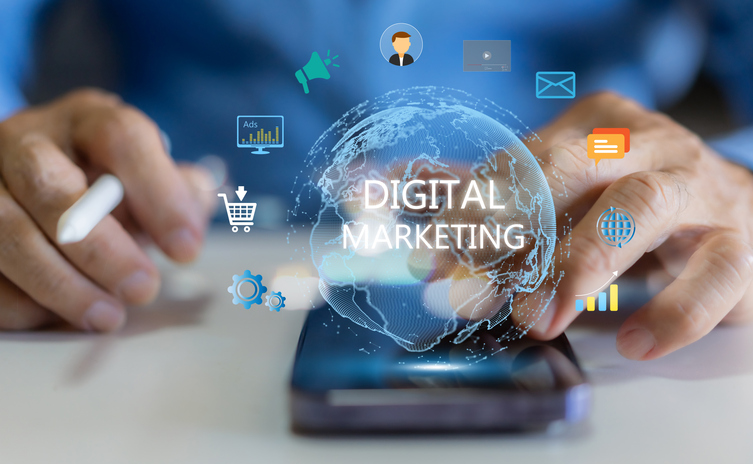In today's digital age, businesses must navigate various marketing strategies to reach and engage their target audiences effectively. Two of the most prominent strategies are digital marketing and social media marketing. While these terms are often used interchangeably, they represent distinct approaches with different tools, techniques, and goals. Understanding the differences between digital marketing and social media marketing is crucial for businesses looking to optimize their marketing efforts in the USA.
This comprehensive guide explores the key differences between digital marketing and social media marketing, their respective benefits, and how businesses can leverage both strategies to achieve their goals.
What is Digital Marketing?
Digital marketing is an umbrella term that encompasses all marketing efforts that use digital channels to promote products or services. It includes a wide range of online tactics and strategies designed to reach customers across the internet. Digital marketing aims to build brand awareness, generate leads, and drive conversions by utilizing various online platforms and tools.
Key components of digital marketing include:
- Search Engine Optimization (SEO): Optimizing website content to rank higher in search engine results, driving organic traffic.
- Pay-Per-Click Advertising (PPC): Running paid ads on search engines like Google and Bing, where advertisers pay for each click.
- Content Marketing: Creating and distributing valuable content to attract and engage a target audience.
- Email Marketing: Sending targeted emails to nurture leads and build relationships with customers.
- Affiliate Marketing: Partnering with affiliates who promote your products or services in exchange for a commission.
- Display Advertising: Placing banner ads on websites to increase brand visibility.
- Video Marketing: Using videos to promote products, services, or brand messages across various platforms.
- Influencer Marketing: Collaborating with influencers to promote products or services to their audience.
Digital marketing is a comprehensive strategy that targets users across multiple online channels, offering flexibility and a broad reach. It is a critical component of any modern marketing plan.
What is Social Media Marketing?
Social media marketing is a subset of digital marketing that specifically focuses on promoting products, services, or brands through social media platforms. It involves creating and sharing content on platforms like Facebook, Instagram, Twitter, LinkedIn, TikTok, and others to engage with users and build a loyal following.
Key components of social media marketing include:
- Content Creation: Developing engaging and shareable content, such as images, videos, and posts tailored for specific social media platforms.
- Community Management: Building and nurturing relationships with followers by responding to comments, messages, and mentions.
- Social Media Advertising: Running paid ads on social media platforms to reach a broader audience or target specific demographics.
- Influencer Collaborations: Partnering with social media influencers to promote products or services.
- Analytics and Reporting: Tracking social media performance using platform-specific analytics tools to measure engagement, reach, and ROI.
Social media marketing is highly effective for building brand awareness, engaging with customers, and driving traffic to your website. Its strength lies in its ability to foster direct communication and interaction with your audience.
Key Differences Between Digital Marketing and Social Media Marketing
While digital marketing and social media marketing share similarities, they differ in scope, focus, and execution. Understanding these differences can help businesses allocate resources more effectively and achieve better results.
- Scope and Reach
- Digital Marketing: Encompasses a wide range of online marketing strategies that target users across various platforms, including search engines, websites, email, and social media. It offers a broader reach and allows businesses to connect with potential customers through multiple touchpoints.
- Social Media Marketing: Focuses solely on social media platforms. While it is highly effective for building communities and engaging with customers, its reach is limited to the users of those platforms.
- Targeting and Audience
- Digital Marketing: Offers extensive targeting options, allowing businesses to reach users based on their search behavior, browsing habits, email interactions, and more. It can be highly personalized and tailored to specific customer segments.
- Social Media Marketing: Primarily targets users based on their social media activity, interests, and demographics. While it offers powerful targeting tools, it is limited to the data available on social media platforms.
- Cost and ROI
- Digital Marketing: Includes a mix of paid and organic strategies. While PPC campaigns can be costly, SEO and content marketing can provide long-term benefits with a lower investment. The ROI of digital marketing depends on the channels used and the effectiveness of the campaigns.
- Social Media Marketing: Generally involves lower upfront costs, especially for organic content. However, paid social media ads can become expensive depending on the competition and targeting options. Social media marketing typically offers a faster return on investment, especially for direct engagement and brand awareness campaigns.
- Engagement and Interaction
- Digital Marketing: While it offers various ways to engage with customers (e.g., email, content, ads), the interaction is often one-way. Digital marketing focuses more on reaching users with targeted messages rather than fostering direct communication.
- Social Media Marketing: Emphasizes two-way communication and interaction. It allows businesses to engage directly with their audience, respond to feedback, and build relationships in real-time. This makes it particularly effective for customer service and community building.
- Tools and Platforms
- Digital Marketing: Involves a wide range of tools, including Google Analytics, SEO software, email marketing platforms, and more. It requires a mix of technical and creative skills to execute effectively.
- Social Media Marketing: Relies on platform-specific tools like Facebook Business Manager, Instagram Insights, and Twitter Analytics. It requires a strong understanding of social media trends and content creation.
When to Use Digital Marketing vs. Social Media Marketing
Both digital marketing and social media marketing are essential for a comprehensive online marketing strategy. However, the choice between the two depends on your business goals, target audience, and budget.
- Use Digital Marketing When:
- You want to reach a broader audience across multiple online channels.
- You aim to improve search engine rankings and drive organic traffic to your website.
- You need a long-term strategy that combines various tactics, such as SEO, email marketing, and PPC.
- You want to target specific customer segments based on their online behavior.
- Use Social Media Marketing When:
- You want to build brand awareness and engage directly with your audience.
- You are focused on community building and fostering customer relationships.
- You aim to create shareable content and leverage user-generated content.
- You are running campaigns that require real-time interaction and feedback.
How Digital Marketing and Social Media Marketing Work Together
While digital marketing and social media marketing have distinct differences, they often work best when integrated. For example, a business can use SEO and PPC to drive traffic to its website while using social media to engage with customers and promote content. Email marketing can also be combined with social media campaigns to nurture leads and convert them into loyal customers.
By leveraging both strategies, businesses can create a cohesive online presence that maximizes their reach and impact.
Conclusion
Understanding the differences between digital marketing and social media marketing is crucial for businesses looking to optimize their online marketing efforts. While digital marketing offers a broader reach and more diverse tools, social media marketing excels in direct engagement and community building. By combining both strategies, businesses can create a comprehensive and effective marketing plan that drives results.
Focus Digital Marketing offers the best digital marketing courses and certifications in the USA for those looking to further enhance their digital marketing skills and stay ahead in this competitive field. Explore their offerings to gain the knowledge and expertise needed to excel in both digital and social media marketing.
FAQs
- Can I use social media marketing without a broader digital marketing strategy?
- Yes, you can use social media marketing independently, especially if your goal is to build brand awareness and engage with your audience. However, integrating it with a broader digital marketing strategy can amplify your results.
- Which is more cost-effective: digital marketing or social media marketing?
- The cost-effectiveness of each strategy depends on your goals and budget. Social media marketing is generally more affordable for organic content, while digital marketing can offer higher ROI through targeted campaigns like SEO and PPC.
- How can I integrate digital marketing and social media marketing effectively?
- You can integrate both strategies by using social media to promote your content, engage with your audience, and drive traffic to your website. Simultaneously, use digital marketing tactics like SEO and email marketing to support your social media efforts and reach a broader audience.

![]() The Amazing Team at Focus Digital Marketing
:
Sep 3, 2024 3:48:18 AM
The Amazing Team at Focus Digital Marketing
:
Sep 3, 2024 3:48:18 AM


